
Lebanon, officially the Republic of Lebanon or the Lebanese Republic, is a country in West Asia. It is located between Syria to the north and east and Israel to the south, while Cyprus lies to its west across the Mediterranean Sea; its location at the crossroads of the Mediterranean Basin and the Arabian hinterland has contributed to its rich history and shaped a cultural identity of religious diversity. It is part of the Levant region of the Middle East. Lebanon is home to more than five million people and covers an area of 10,452 square kilometres (4,036 sq mi), making it the second-smallest country in continental Asia. The official language of the state is Arabic, while French is also formally recognized; Lebanese Arabic is the country's vernacular with French & English being significantly present with Modern Standard Arabic being limited to news and government matters.
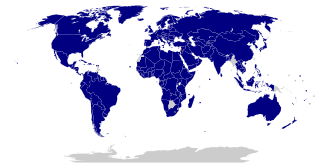
The foreign policy of Lebanon reflects its geographic location, the composition of its population, and its reliance on commerce and trade. Until 2005, Lebanon's foreign policy had been heavily influenced by Syria. The framework for relations was first codified in May 1991, when Lebanon and Syria signed a treaty of mutual cooperation. This treaty came out of the Taif Agreement, which stipulated that "Lebanon is linked to Syria by distinctive ties deriving strength from kinship, history, and common interests." The Lebanese-Syria treaty calls for "coordination and cooperation between the two countries" that would serve the "interests of the two countries within the framework of sovereignty and independence of each." Numerous agreements on political, economic, and security. After Syria's military withdrawal in 2005, Lebanon's foreign policy charted a more independent course.
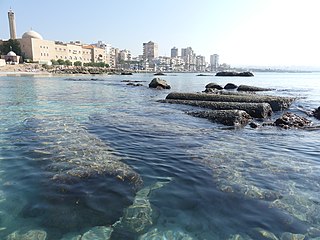
Tyre is a city in Lebanon, one of the oldest continually inhabited cities in the world, though in medieval times for some centuries by just a tiny population. It was one of the earliest Phoenician metropolises and the legendary birthplace of Europa, her brothers Cadmus and Phoenix, as well as Carthage's founder Dido (Elissa). The city has many ancient sites, including the Tyre Hippodrome, and was added as a whole to UNESCO's list of World Heritage Sites in 1984. The historian Ernest Renan noted that "One can call Tyre a city of ruins, built out of ruins".

Laclede County is a county located in the U.S. state of Missouri. As of the 2020 census, the population was 36,039. Its county seat is Lebanon. The county was organized February 24, 1849, and was named after Pierre Laclède, founder of St. Louis.

Lebanon (/ˈlɛbnən/) is a city in and the county seat of Boone County, Indiana, United States. The population was 15,792 at the 2010 census. Lebanon is located in central Indiana, approximately 29 miles (47 km) northwest of downtown Indianapolis and 36 miles (58 km) southeast of Lafayette.

Lebanon is a home rule-class city and the county seat of Marion County, Kentucky, in the United States. The population was 6,274 at the 2020 census, up from 5,539 in 2010. Lebanon is located in central Kentucky, 63 miles (101 km) southeast of Louisville. A national cemetery is nearby.

Lebanon is a city in and the county seat of Laclede County in Missouri. The population was 14,474 at the time of the 2010 census. It is the county seat of Laclede County. The Lebanon Micropolitan Statistical Area consists of Laclede County.
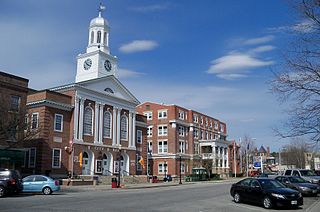
Lebanon is the only city in Grafton County, New Hampshire, United States. The population was 14,282 at the 2020 census, up from 13,151 at the 2010 census. Lebanon is in western New Hampshire, south of Hanover, near the Connecticut River. It is the home to Dartmouth–Hitchcock Medical Center and Dartmouth College's Geisel School of Medicine, together comprising the largest medical facility between Boston, Massachusetts, and Burlington, Vermont.

Mt. Lebanon is a township with home rule status in Allegheny County, Pennsylvania, United States. The population was 34,075 at the 2020 census. It is a suburb of Pittsburgh. Established in 1912 as Mount Lebanon, the township was a farming community. With the arrival of the first streetcar lines and the development of the first real estate subdivision, both in 1901, it became a streetcar suburb, offering residents the ability to commute to Downtown Pittsburgh. Further, the opening of the Liberty Tunnel in 1924 allowed easy automobile access to Pittsburgh. In 1975, the renamed Mt. Lebanon adopted one of the first home rule charters in Pennsylvania.

Cedrus libani, the cedar of Lebanon or Lebanese cedar, is a species of tree in the genus cedrus, a part of the pine family, native to the mountains of the Eastern Mediterranean basin. It is a large evergreen conifer that has great religious and historical significance in the cultures of the Middle East, and is referenced many times in the literature of ancient civilisations. It is the national emblem of Lebanon and is widely used as an ornamental tree in parks and gardens.

The American University of Beirut (AUB) is a private, non-sectarian, and independent university chartered in New York with its campus in Beirut, Lebanon. AUB is governed by a private, autonomous board of trustees and offers programs leading to bachelor's, master's, MD, and PhD degrees.

The Prime Minister of Lebanon, officially the President of the Council of Ministers, is the head of government and the head of the Council of Ministers of Lebanon. The Prime Minister is appointed by the president of Lebanon, with the consent of the plurality of the members of the Parliament of Lebanon. By convention, the office holder is always a Sunni Muslim.
The Lebanese American University is a secular private American university in Lebanon. It is chartered by the board of regents of the University of the State of New York and is accredited by the New England Commission of Higher Education (NECHE). It has two campuses and offers 58 degrees.
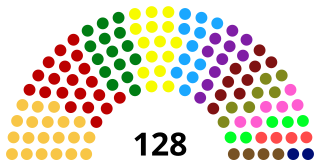
The Lebanese Parliament is the national parliament of the Republic of Lebanon. There are 128 members elected to a four-year term in multi-member constituencies, apportioned among Lebanon's diverse Christian and Muslim denominations but with half of the seats reserved for Christians and half reserved to Muslims per Constitutional Article 24. Lebanon has universal adult suffrage. Its major functions are to elect the President of the republic, to approve the government, and to approve laws and expenditure.

The Lebanese people are the people inhabiting or originating from Lebanon. The term may also include those who had inhabited Mount Lebanon and the Anti-Lebanon Mountains prior to the creation of the modern Lebanese state. The major religious groups among the Lebanese people within Lebanon are Shia Muslims (27%), Sunni Muslims (27%), Maronite Christians (21%), Greek Orthodox Christians (8%), Melkite Christians (5%), Druze (5.2%), Protestant Christians (1%). The largest contingent of Lebanese, however, comprise a diaspora in North America, South America, Europe, Australia and Africa, which is predominantly Maronite Christian.
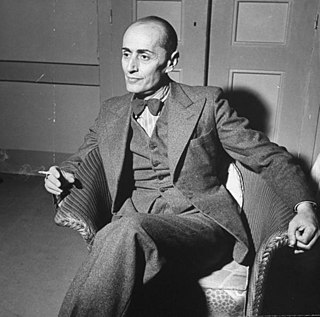
Alfred Georges Naccache was a Lebanese Maronite statesman, Prime Minister and head of state during the French Mandate of Lebanon. In 1919 he contributed to La Revue Phénicienne which was established by Charles Corm in Beirut. He was serving as Prime Minister when he was appointed president by the French authorities after the resignation of Emile Edde. Pierre-Georges Arlabosse served as acting president for 6 days before Naccache assumed office. From 1953 to 1955 he served as Foreign Minister. The National Museum of Beirut was opened by him on 27 May 1942.
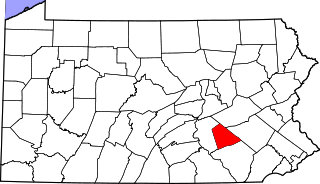
This is a list of the National Register of Historic Places listings in Lebanon County, Pennsylvania.

The Lebanese National Library, located in Beirut, is the national library of Lebanon. It closed to the public in 1979 due to the Lebanese Civil War, and its surviving collections were placed in storage. Restoration of its volumes and planning for a new site began in 1999.